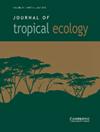Potential seed dispersal agents of Monoon liukiuense on Iriomote Island, Japan
IF 1
4区 环境科学与生态学
Q4 ECOLOGY
引用次数: 0
Abstract
Abstract Monoon liukiuense (Annonaceae) is an endangered tree species distributed in Iriomote Island and Hateruma Island in the Ryukyu (Nansei) Islands, Japan, and in Orchid Island (Lanyu) in Taiwan. While its habitat is confined to small areas surrounded by human-altered landscapes, the matured trees bear abundant fruits, and many offspring grow under the mother trees. M. liukiuense is hypothesised to have lost effective seed dispersers. To test this hypothesis, fate of its seeds and the behaviour of frugivores were observed using time-lapse photography during three fruiting seasons from June 2015 to August 2016 in Iriomote Island, Japan. Although several animal taxa were observed to consume the fruit pulp, only two volant animals, namely the Yaeyama flying fox and large-billed crow, were proposed as seed dispersal agents for M. liukiuense. The present study shows that an average of 82% of the fruits in the canopies fell directly beneath the fruiting trees and an average of 90% of the seeds on the forest floor remained in their original positions. These results suggest that M. liukiuense has lost most of its seed dispersal agents and the chance to expand its distribution.日本伊里奥莫特岛柳蝇种子潜在传播因子
摘要花木属(Monoon liukiuense)是一种濒危树种,分布于日本琉球群岛的Iriomote岛和Hateruma岛,以及台湾兰屿岛。虽然它的栖息地局限于被人类改变的景观包围的小区域,但成熟的树木结出了丰富的果实,许多后代在母树下生长。据推测,M. liukiuense已经失去了有效的种子传播器。为了验证这一假设,研究人员在2015年6月至2016年8月期间,利用延时摄影技术,在日本伊里奥莫特岛观察了其种子的命运和食果动物的行为。虽然有几个动物类群被观察到吃果肉,但只有八山狐和大喙鸦两种动物被认为是柳kiuense的种子传播媒介。目前的研究表明,平均82%的树冠果实直接落在果树下,平均90%的种子在森林地面上保持在原来的位置。这些结果表明,柳kiuense已经失去了大部分的种子传播媒介和扩大其分布的机会。
本文章由计算机程序翻译,如有差异,请以英文原文为准。
求助全文
约1分钟内获得全文
求助全文
来源期刊

Journal of Tropical Ecology
环境科学-生态学
CiteScore
2.10
自引率
0.00%
发文量
44
审稿时长
18-36 weeks
期刊介绍:
Journal of Tropical Ecology aims to address topics of general relevance and significance to tropical ecology. This includes sub-disciplines of ecology, such as conservation biology, evolutionary ecology, marine ecology, microbial ecology, molecular ecology, quantitative ecology, etc. Studies in the field of tropical medicine, specifically where it involves ecological surroundings (e.g., zoonotic or vector-borne disease ecology), are also suitable. We also welcome methods papers, provided that the techniques are well-described and are of broad general utility.
Please keep in mind that studies focused on specific geographic regions or on particular taxa will be better suited to more specialist journals. In order to help the editors make their decision, in your cover letter please address the specific hypothesis your study addresses, and how the results will interest the broad field of tropical ecology. While we will consider purely descriptive studies of outstanding general interest, the case for them should be made in the cover letter.
 求助内容:
求助内容: 应助结果提醒方式:
应助结果提醒方式:


